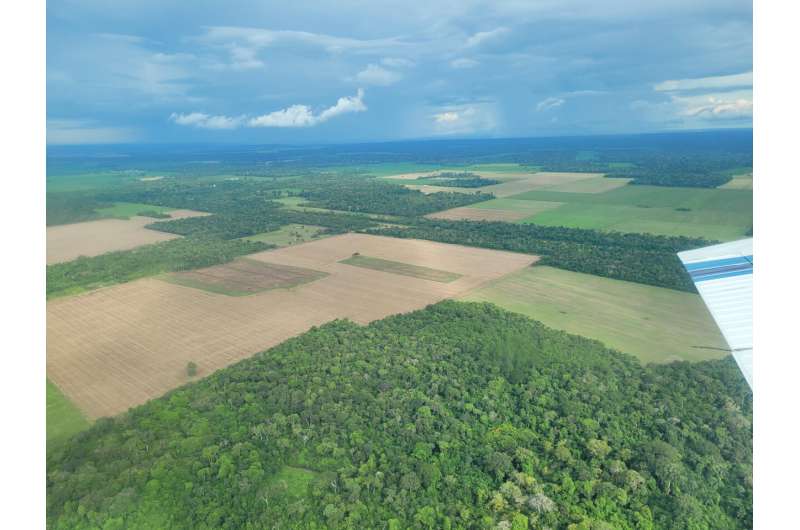This article has been reviewed according to Science X's editorial process and policies. Editors have highlighted the following attributes while ensuring the content's credibility:
fact-checked
peer-reviewed publication
reputable news agency
proofread
Amazon emissions soared under Brazil's Bolsonaro: study

The Amazon rainforest's carbon emissions doubled in 2019 and 2020, as a decline in environmental policing under Brazilian ex-president Jair Bolsonaro led to a surge in destruction of the increasingly fragile region, researchers reported Wednesday.
The world's biggest rainforest is a vital buffer against climate change, but studies show it has started emitting more carbon than it absorbs, pushed to a dangerous "tipping point" by deforestation and fires—mainly for cattle ranching and farming.
Using air samples from research flights over the rainforest, scientists found the Amazon's carbon emissions soared from 240 million tons per year on average from 2010 to 2018 to 440 million tons in 2019 and 520 million tons in 2020.
The study, published in the journal Nature, was led by researchers at Brazil's national space agency, INPE, who were among the first to detect that the Amazon had flipped from a net absorber to a net emitter of carbon, despite its hundreds of billions of carbon-absorbing trees.
The new study noted that deforestation in the Brazilian Amazon—about 60 percent of the entire rainforest, which spans eight South American countries—increased by 80 percent in 2019-2020, compared to the 2010-2018 average.
Burned areas across the Amazon basin meanwhile increased by 14 percent in 2019 and 42 percent in 2020, compared to the average from the previous eight years.
That coincided with a sharp decline in environmental policing in Brazil under far-right ex-president Bolsonaro (2019-2022) and controversial ex-environment minister Ricardo Salles, said the study's lead author, Luciana Gatti.
Brazil's environmental agencies "stopped issuing fines, stopped embargoing land involved in environmental crimes, stopped burning the heavy equipment used to destroy the forest," she told AFP.
"Those measures all plunged during the Bolsonaro administration."
Lula faces looming test
The researchers said their results indicated this "dismantling" of environmental policies had led to increased deforestation, fires and ecosystem degradation, fueling the Amazon's carbon emissions.
The increase in emissions versus the 2010 to 2018 period was equal to 83 percent for 2019 and 117 percent for 2020—or double, using the 2019-2020 average.
Experts warn the destruction of the Amazon could push the rainforest to a point of no return, beyond which large portions dry out and turn to savannah.
The trees that die off would release their carbon stores back into the atmosphere, with catastrophic consequences for global warming.
In Brazil, deforestation has so far wiped out around one-fifth of the rainforest, driven mainly by cattle ranching.
Brazil's agribusiness sector was closely allied with Bolsonaro, and is a powerful player in the country, the world's top exporter of beef and soybeans.
However, the forces driving the Amazon's destruction go far beyond Brazil, Gatti emphasized.
"The world wants cheap beef, cheap soy for animal feed, so we're destroying the forest to raise cattle and soybeans," she said.
"That's the engine driving this."
Deforestation in the Brazilian Amazon has fallen since veteran leftist Luiz Inacio Lula da Silva succeeded Bolsonaro in January, vowing "Brazil is back" in the fight against climate change.
Under Lula, who beat Bolsonaro in a divisive election, deforestation in the Brazilian Amazon fell by 42.5 percent from January to July, versus the same period last year.
But experts say the real test for the new administration starts now, with the onset of drier weather in the Amazon—typically peak deforestation season.
The El Niño weather phenomenon, which returned this year for the first time in seven years, is also creating hotter, drier conditions in the region, which will likely fuel the fire.
More information: Luciana Gatti, Increased Amazon carbon emissions mainly from decline in law enforcement, Nature (2023). DOI: 10.1038/s41586-023-06390-0. www.nature.com/articles/s41586-023-06390-0
Journal information: Nature
© 2023 AFP





















